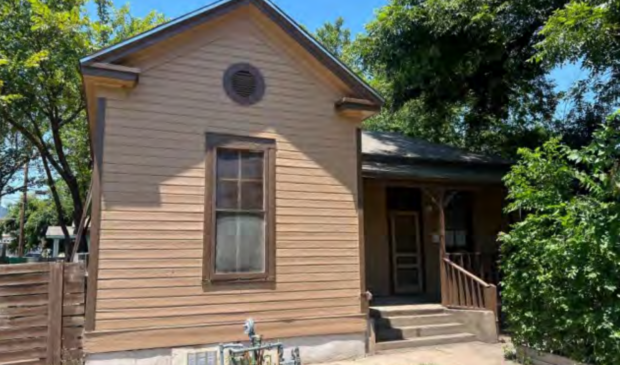Valid petitions fail to sway Council in two zoning cases
Tuesday, January 23, 2024 by
Jo Clifton Last week, City Council approved historic zoning on first reading for a small Folk Victorian house in East Austin over the objection of the owner of the property at 1100 E. Second St. The Planning Commission approved recommending historic zoning in December.
The owner, who wanted to demolish the house, filed a valid petition requiring at least nine members of Council to approve the historic designation. Only Council Member Paige Ellis voted against the motion. In order for the zoning to be approved, Council will have to vote for the zoning on all three readings — a situation that rarely happens.
The primary building being considered was constructed between 1888 and 1897. The lot at the corner of Medina and Second streets was used as an auction yard in 1887. That year, Charles S. Sinnigson, a carpentry foreman, purchased the home and lived there with his wife, Mary Elizabeth. According to documents related to the case, “Sinnigson had worked as stage manager and carpenter for both the Millett Opera House and the Hyde Park Pavilion before moving to East Austin. … Sinnigson, son of local German pioneers, plied his trade as a carpenter and cabinetmaker into his seventies. Over the course of his career, he became a prominent Austin builder. After Charles Sinnigson’s death in 1934,” his wife remained in the home until her own death in 1938.
The property owner did not speak at the Council meeting. The only speaker was JuanRaymon Rubio, a member of the board of Preservation Austin, as well as an appointee on the Historic Landmark Commission. He urged Council to designate the property as historic, noting that many historic East Austin homes have been demolished.
“This neighborhood was once determined to be hazardous due to a 1934 redlining map,” Rubio said. “Obviously, most of us know the history of that, which regarded Black and brown neighborhoods as slums and preventing people from maintaining and building on these lots. So this is a chance for us to start that new equitable chapter of preservation.”
Council did not comment on the case.
In a second case involving a valid petition, Council approved changes to properties at 1512 Damon Road and 7606 Albert Road in South Austin. Neighbors had gathered enough signatures to create a valid petition, but only Council Member Alison Alter voted against the zoning change.
The Damon Road property was zoned SF-3. The Albert Road property was zoned DR, or development reserve. Attorney Michael Whellan represented the property owner, Matt McDonnell, doing business as Albert Road Horizontal Investors, LP. He was seeking SF-6 zoning, with no conditional overlay. According to material provided by city staff, the development will have 46 residential units, with SF-6 zoning, but staff recommended a conditional overlay that would limit the number of units to seven per acre, or a total of 22 units. One reason staff gave for the recommendation was what they called “substandard infrastructure” on Albert Road.
The property owner did not agree with the conditional overlay, although the neighborhood representative, Karen Fernandez, told Council that they would support that particular change to zoning. She voiced a variety of concerns, many having to do with the substandard street.
Fernandez expressed dismay that Council would consider all three readings of the case when there was a valid petition. She pointedly said that District 5 Council Member Ryan Alter had said he would not support the conditional overlay.
District 10’s Alison Alter was the only member to vote against the zoning change. She did not explain her opposition, but she has expressed concerns on numerous occasions about how people will safely exit property that is next to undeveloped land, known as the Wildland-Urban Interface. She has consistently pushed for greater attention to the likelihood of dangerous wildfires in those areas.
The Austin Monitor’s work is made possible by donations from the community. Though our reporting covers donors from time to time, we are careful to keep business and editorial efforts separate while maintaining transparency. A complete list of donors is available here, and our code of ethics is explained here. This story has been changed since publication to clarify the historic zoning case was only approved on first reading.
You're a community leader
And we’re honored you look to us for serious, in-depth news. You know a strong community needs local and dedicated watchdog reporting. We’re here for you and that won’t change. Now will you take the powerful next step and support our nonprofit news organization?






